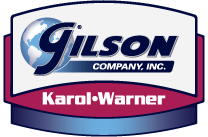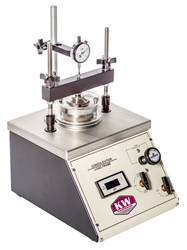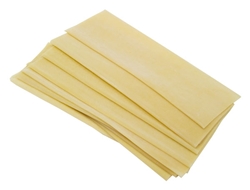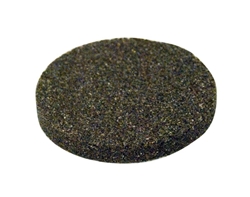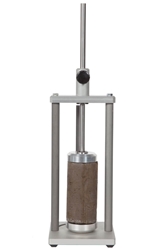Soil Testing Equipment
Soils testing equipment for the field or laboratory is an important part of civil engineering design for pavements, embankments, foundations, and other structures. Geotechnical testing provides critical information on soil classification and soil mechanics to determine if the soil can support the proposed construction project. Tests such as Consolidation, Permeability, California Bearing Ratio (CBR), Direct /Residual Shear, and Triaxial Shear Strength, are just a few of the test methods used to determine soil properties.

Geotechnical testing equipment by Karol Warner meets requirements for a wide range of ASTM and AASHTO test methods. Our load frames, triaxial panels and test cells, direct shear machines, permeability panels, and test cells, and consolidation equipment provide years of accurate and reliable use for all your geotechnical and soil mechanics testing applications.
- Triaxial Shear Strength equipment measures soil shear strength of cylindrical samples confined with lateral fluid pressures in a test cell. Karol-Warner triaxial test cells, porous stones, latex membranes, and accessories are available for all popular specimen sizes and can be used in load frames from most other manufacturers. Load frames with variable rates of strain, pressure control panels, sample preparation equipment, and load and displacement components allow tests to be performed in accordance with ASTM/AASHTO requirements. Optional data acquisition software simplifies the calculation and reporting of test results.
- Consolidation occurs as water is forced out of the soil matrix under long-term static loading. This results in a volume reduction as soil particles pack more tightly together. Consolidation testing allows for the prediction of this volume change. The rate of consolidation, as well as total consolidation, are important factors in structural foundation design. Karol-Warner Pneumatic Consolidation Frames, or Oedometers, feature our patented CONBEL®pneumatic loading system. Our Dead-Weight Consolidation Frames operate with variable mechanical lever ratios of 9:1, 10:1, or 11:1. Consolidometer cells are available in all popular sizes, and many are compatible with other manufacturer’s Load Frames.
- Unconfined Compressive Strength is a simple determination of the compressive strength of soil when there are no confining forces applied. A cylindrical specimen is axially loaded in compression to failure. Load frames with variable loading rates are outfitted with analog or digital component sets with required swivel and bearing platens to determine the stress and strain of soil specimens. Data acquisition software collects, calculates, and reports testing data. Sample preparation accessories make test set-up easy.
- Direct Shear test machines determine the shear strength properties of soil when it's forced to fail horizontally. Dead-weight and pneumatic direct and residual shear machines meet requirements of ASTM/AASHTO test methods. Also available is a wide variety of shear boxes, sample preparation accessories, weight sets, and data acquisition software for recording and calculating Direct/ Residual shear strengths of soil.
- Permeability tests of soil determine the hydraulic conductivity or flow characteristics of fluids through soils and granular materials. A complete selection of equipment for constant-head or falling head tests using popular sizes of the rigid wall or flexible wall test cells is available. A variety of unique permeameters are designed for special applications. Select Control Panels, Manometers, Burettes, and other components to assemble the best test system for your application. The Double-Ring Infiltrometer is used in the field to determine the in-place infiltration rate.
- California Bearing Ratio (CBR) laboratory equipment measures the penetration resistance of compacted soils or base course materials for pavements. Specimens compacted into CBR molds are prepared by soaking and measuring expansion, then mounted in a load frame for axial penetration with a piston. Load frames, sample molds, and penetration pistons meet ASTM and AASHTO requirements for laboratory CBR tests. Similar LBR equipment meets Florida standards for Limerock Bearing Ratio (LBR) testing. The Data Acquisition Software (optional) computes, records, and reports test results.
- Geotextile Testing provides assurance that geosynthetic and geomembrane material will provide the intended reinforcement, stabilization, or drainage characteristics of engineered soil installations. High-capacity direct shear machines measure internal shear strengths of geosynthetics or shear resistance between geosynthetics and compacted soil materials. The Soil Geotextile Permeameter determines permeability values and clogging tendencies of soil/textile systems. Products meet current ASTM standards.
- Proctor Compaction tests determine the moisture-density relationship of soils, a fundamental value used to control the installation of engineered fills and embankments. Soil Density mold assemblies meet ASTM and AASHTO test specifications are available in both 4in and 6in diameters. Sample ejectors provide a safe and easy way to extrude compacted samples. The popular hand penetrometer estimates a cohesive soil’s penetration resistance at varying moisture contents.
- Soil-Cement testing equipment is used to determine the compressive strength of soil and cement mixes. Soil-cement is often a base used in pavements for its strength. Equipment includes load frames and components that meet ASTM and AASHTO test standards.
- Load Frames are an essential laboratory tool, they are adaptable for numerous applications in geotechnical and construction materials testing. Outfitting the basic load frames with available components equips them to perform triaxial shear, unconfined compressive strength, soil cement, and other geotechnical and soil mechanic testing applications. Models with various strain rate ranges and capacities meet the needs for different ASTM/AASHTO testing applications.
- Load & Displacement Measurement components determine forces applied during testing and the resulting deformation of test specimens. Choose from an extensive line of load cells, proving rings, displacement transducers, mechanical, and digital dial indicators. Analog or digital options set up easily on load frames and other laboratory equipment from Karol-Warner or other manufacturers. Data Acquisition Software modules can be used with two and four-channel digital readout systems that allow real-time collection, processing, and reporting of data for specific ASTM/AASHTO test methods.
- Latex Membranes provide a waterproof barrier for soil samples in triaxial or flexible-Wall permeability testing. Pure latex membranes are available for wide popular sample diameters. Lengths are generous and proportional to diameters. Choose from 0.12in or 0.25in thicknesses. Durable, chemical, and abrasion resistant Neoflex is offered in limited diameters.
- Porous Stones in round or square shapes and all popular sizes and thicknesses are used for many geotechnical laboratory tests like permeability, triaxial, consolidation, and direct shear. Karol-Warner porous stones are manufactured from aluminum oxide or sintered bronze, and custom sizes are quoted on request.
- Data Acquisition Software displays real-time force and dimensional measurements, records, and processes data, and generates test reports for many geotechnical and asphalt laboratory applications. Separate software modules are available for California bearing ratio / Limerock bearing ratio, triaxial shear, unconfined compressive strength, soil cement, consolidation, direct/residual shear, and Marshall stability. Modules meet ASTM/AASHTO requirements for the collection and calculation of test results. Each Data Acquisition Software module is optimized for use with Karol-Warner two and four-channel digital readout systems and is available for a 30-day free trial.
- Sample Preparation includes equipment for trimming, preparing, and mounting samples to ensure accurate testing.
